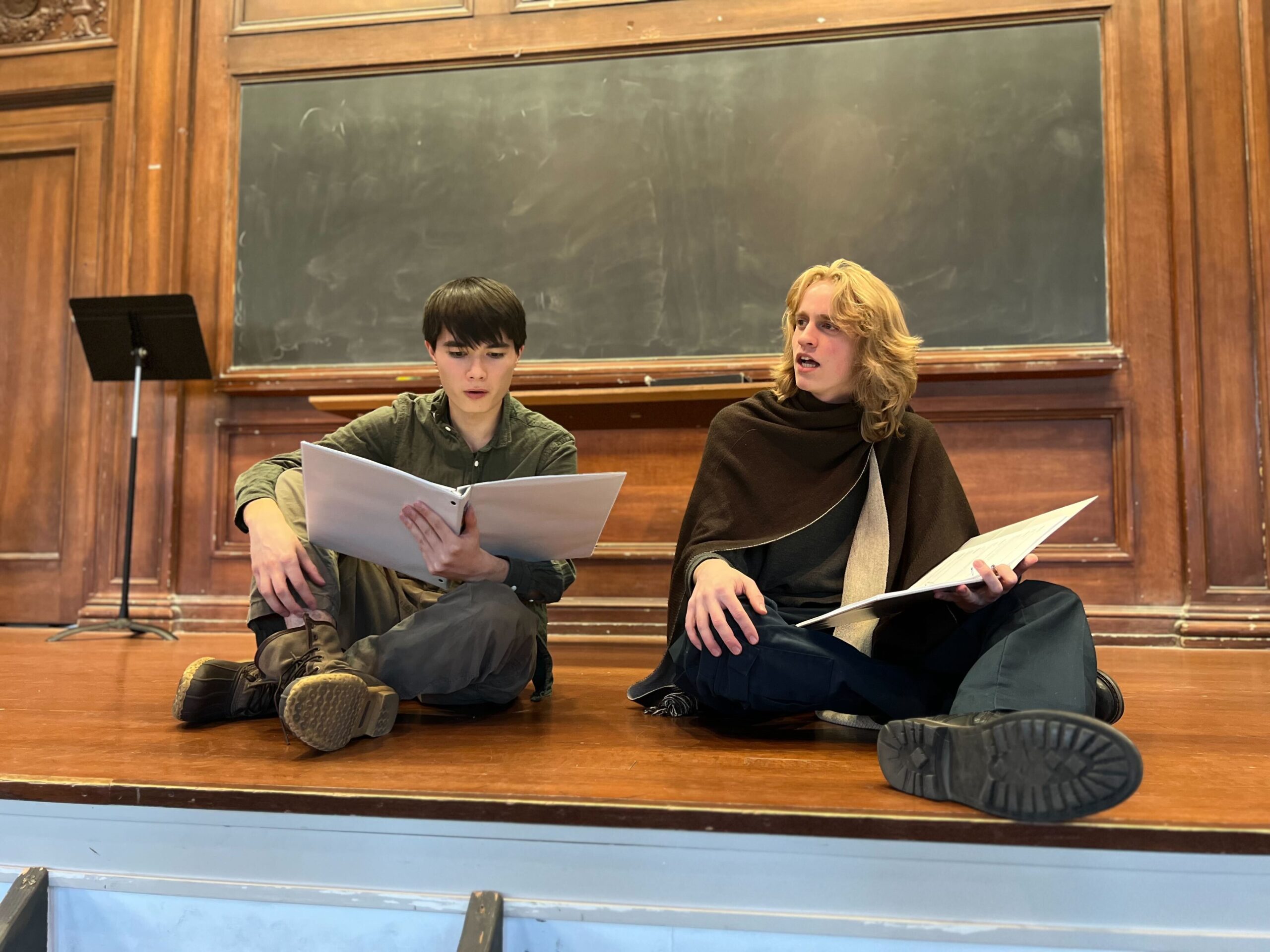
Wave Productions put on Enkidu, a staged play inspired by “The Epic of Gilgamesh” on April 17 and 18. The story follows the monster Enkidu, played by Communication third-year Oliver Tam and the athletic hero Gilgamesh, played by Communication first-year Kyle Vetter. The two fall in love and face the wrath of a world that wants to divide the unlikely pairing. I had the privilege of seeing a preview of Enkidu during their Tech rehearsal on April 16.

The script is the original work of Communication third-year Sydney MacGilvray. The idea came to her after the story was briefly mentioned in the Monsters, Art, and Civilization course with Professor Gunter.
“I took a class last spring about monsters in Ancient Mesopotamian art,” she said. “They talked about Enkidu, who is Gilgamesh’s ambiguous, monstrous companion. I was really drawn in by someone who is caught between two worlds of monster and human.”
Despite its age, Vetter and Weinberg second-year Cadence Hornsby, who plays the Gods, didn’t know about the tale before starting the production process. Vetter said he looked forward to seeing the variety of audience reactions.
“It’s gonna be cool to see the difference between the people who have had exposure to it already and are seeing a very different version now [and] the people who have never heard it before,” Vetter said ahead of the show.
Though I hadn’t read the original text, Enkidu still offered so much. There were multiple battle scenes, an ode to MacGilvaray’s experience with fight coordination. Though using music stands to hold binders during staged readings is often seen as a hindrance, the show turned the stands into props — using them as weapons or an avenue for characterization. For example, one character’s music stand is shortened as they are defeated in battle. The creativity and innovation in this show adds so much to the story.

The show is Communication second-year Felix Gaddie’s first time directing, and, according to Hornsby, his approach has helped her feel more comfortable with herself as a non-theatre major.
“I’ll ask him, ‘Did that look right? Do you want me to change that?’ and his answer for me will be, ‘Well, I want you to think about it first,’ she said. “His directing style has been something unique for me, but also a cool challenge.”
This performance is also a staged reading, meaning actors perform it while reading directly from scripts. This is common in productions that involve new, student-written work, as it allows actors to easily work with an evolving script. For MacGilvray, a staged reading also meant access to support in revising the script.
“It was so helpful because [of] the freedom to have it be something that could be constantly revised – rewrite this scene, check in with actors,” she said. “Being able to play with it in the room was a really great way to approach revising my first full-length play.”
Hornsby echoed this sentiment, and it was reflected in the questions that were asked to actors during rehearsals.
“In this process there is a big focus on Sydney asking us, ‘How did that feel? Are there things you specifically want me to change?’” she said. “We focus on what feels natural as we’re saying it.”
Due to the nature of a staged reading, Vetter found the relationship between the cast and the written material became deeply intertwined.
“We’ve had such a hand in making it our own,” Vetter said. “We’re the first cast ever to put this on. All of our characters are true to ourselves, what we feel now and how we connect with these ancient characters and this story.”
Regarding the performances, the glimpse I stole was wonderful. Tam’s physicality as a monstrous character is stellar, undoubtedly aided by Gaddie’s 12-year background in dance.

There is a scene in which Enkidu is silenced by the Goddess Ishtar and struggles to breathe, and Tam slips into an altered physical state at unfathomable speed.
Communication third-year Austin Kelly plays Humbaba, a monster-esque figure, with a perfect voice. With closed eyes, it would be hard to believe Kelly isn’t a murderous beast. Vetter’s portrayal of Gilgamesh brings a modern sense of comedy. Despite the setting, it doesn’t feel out of place and earned a few chuckles throughout the show.
With actors who are so good at what they do, the show perfectly tells the story it wants to tell. At its core, Enkidu is about the endurance of “The Epic of Gilgamesh” and its resonance in storytelling today.
“I really hope people come out of it seeing how these thousands-of-years-old stories can still feel exciting and fresh and relevant,” MacGilvary said. “It is a story about the importance of telling stories.”



